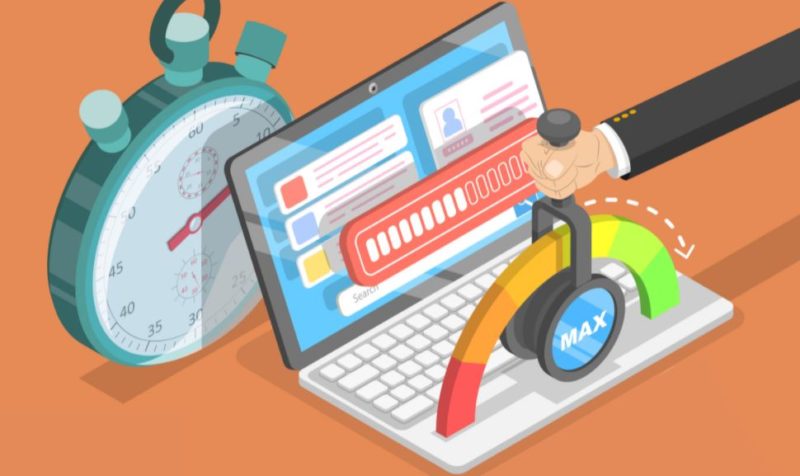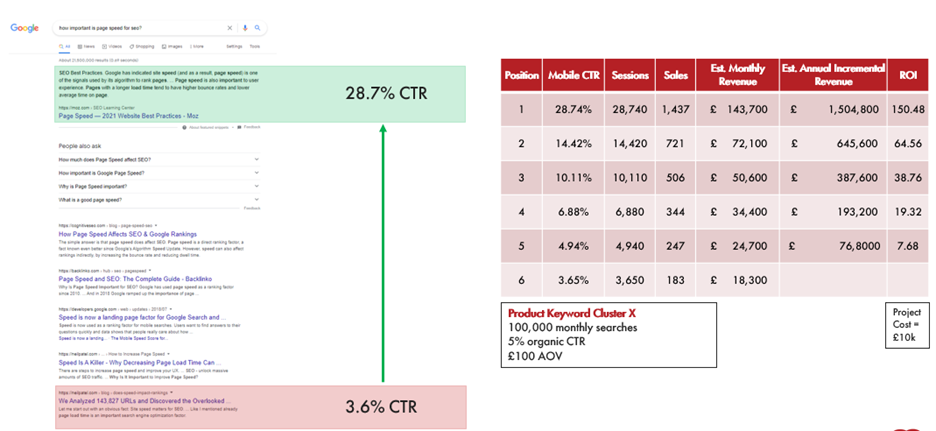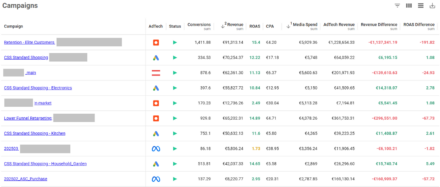The Need For Speed: Unlock SEO ROI With Page Speed Optimisation

Page speed has been a hot topic in SEO for many years. This focus has been significantly heightened over the last 18 months with Google’s shift to a fully mobile-centric approach in response to evolving user behaviour.
On 26th April, our Digital Strategy Director, Scott Donnelly ran a session at Masterclassing’s Workshop Week on the topic of enhancing ROI from SEO through page speed optimisation. Scott looked specifically at the opportunities in this area and the stark threats to ROI that neglecting page speed carries. Those that were lucky enough to attend the talk were provided with many insights and actionable steps.
But don’t worry if you missed the session, we’ve recapped all the key takeaways from Scott’s talk is below.
Just how important is page speed?
Right from the outset, Scott made it clear that page speed is a vital component of an effective website and ecommerce strategy.
This was highlighted by the emphatic findings of a 2020 study by Deloitte; in a review of the luxury retail and travel sector they established that even a 0.1s improvement in page speed can increase revenue by up to 18%.
Considering this insight alongside some of the key facets of the online trading environment emphasizes just how pivotal the role of page speed is. Most pertinently:
- Mobile is the dominant traffic driver and has been consistently since Q2 ’19.
- In fact, 82% of total traffic to QueryClick’s ecommerce clients is from mobile devices.
- Google made the switch to mobile first indexing in March ’21 and will continue focus in this area with the upcoming Core Web Vitals element of their ranking algorithm.
So, the speed and stability of pages loading on mobile devices are crucial to a positive user experience for the vast majority of potential customers on ecommerce sites (and will therefore assist in generating conversions). Moreover, it is an essential part of getting these visitors to the site in the first place as Google uses the ‘mobile version’ of pages when indexing and ranking them.
Adopting a mobile-first philosophy to drive success
If you’re not already there, then reviewing digital processes and KPIs and embedding mobile centricity will be a crucial part of setting your business up for maximum profitability, in both the short and long-term.
Scott spoke particularly of the need to ensure that site design and technical enhancements are generating positive ROI as page speed will be a key differentiator between you and your competitors. This will be most visible in the organic search results, where page speed will be a key determinant of success.
Perfectly encapsulating this point is a case study from one of our clients:
A reduction of 2 seconds in the time to interactive (one of Google’s Core Web Vitals) drove improved rankings by an average of 5.1 positions and a 121% YoY increase in transactions.
Opportunities, threats and building business cases
With click-through rates being higher with better organic rankings on search engines, so too is the opportunity to generate revenue.
If your site ranks in position 6 for a non-brand query, the average click-through rate is 3.6%; improve that ranking to position 1 and the average click-through rate is 7 times higher.
Using such insights along with average search volumes, your conversion rates and average order values can help build business cases to secure buy in and resource for the required page speed enhancements. In fact, we have found an increased need for the provision of business cases to get best practice technical SEO and page speed solutions implemented.

Just as being able to show actions to improve page speed will drive a positive ROI, it’s also good to take a look at things from a different angle. Crucially, inaction around page speed optimisation will see a decline in performance.
[NEED HELP WITH IMPROVING YOUR PAGE SPEED PERFORMANCE, GET IN TOUCH WITH US TODAY]
As websites evolve, more pages, rich media and functionality are added it’s natural for page speed to regress if it is not a critical consideration in every website update. This really was the crux of Scott’s session; there is both a benefit to optimisation and an opportunity cost of not making it a pre-eminent critical success factor.
Page speed is not a one-off project
Aligned with the risk of unfulfilled potential and even declining revenue, page speed optimisation should be an ongoing activity. Seeing it as a one-off project risks falling into the trap of allowing competitors to beat you and subsequently secure more revenue. To avoid a situation where you are taking one step forward and two steps back, Scott discussed our approach to performance budgeting.
Performance budgeting requires setting a maximum file size or speed that webpages are not allowed to exceed. Setting and sharing these targets pro-actively, rather than retrospectively, while ensuring they are constantly monitored, reviewed and performance is shared helps generate a greater awareness of the impact of website changes on page speed.
Additionally, creating performance dashboards allows you to easily plot page speed against other crucial metrics, such as:
- organic rankings
- CTR
- traffic
- conversions
- revenue
This provides a simple, visual display of the impact of page speed optimisation and encourages greater buy-in from wide ranging stakeholders which can ultimately unlock restrictions on page speed improvements and unleash your ROI.
Test your mobile page speed
Use our page speed tool to discover how you can improve your performance on mobile
Own your marketing data & simplify your tech stack.
Have you read?
Chrome’s announcement on dropping cookie opt-in last month closed the door on a 5 year saga for marketers. But what is the landscape like in 2025 for cookie-based measurement?
Generative AI is transforming the way that marketers plan and assemble content for their Paid Ads. As big platforms like Google, Meta and TikTok increasingly build the tools needed to...
In a surprising move that has sparked heated debate, Mark Zuckerberg announced on his Instagram that Meta will be reducing its levels of censorship and in particular fact-checking on its...



